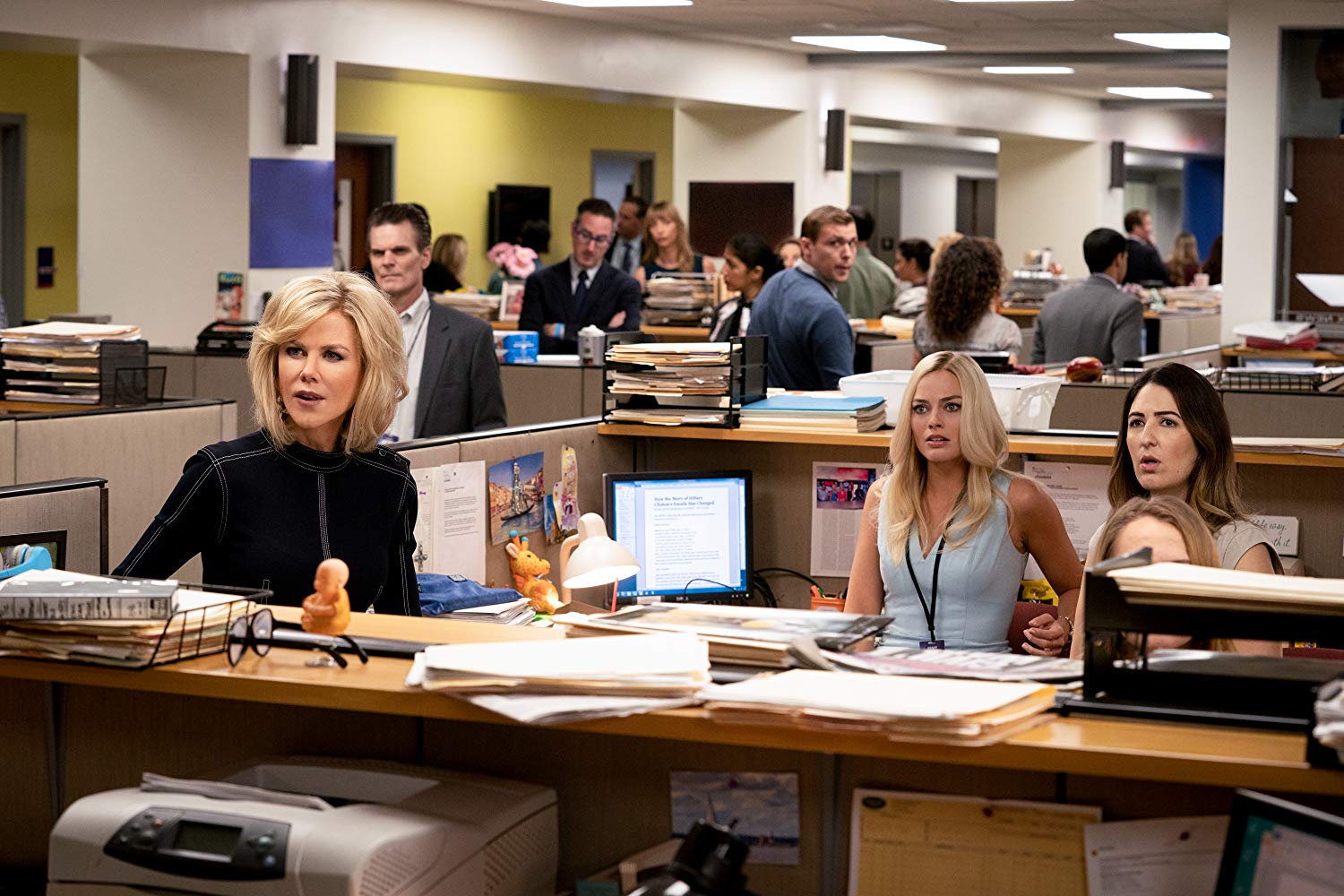In the wake of movements like #MeToo, director Jay Roach and screenwriter Charles Randolph take a close look at the story of a man who abused his power and the women who came together to fight him in the biographical drama Bombshell.
Set against the backdrop of the 2016 Presidential election, Roach and Randolph’s film follows the women at the centre of the highly publicised sexual harassment scandal involving former Fox News CEO Roger Ailes (John Lithgow) and his female staff, most notably anchor Megyn Kelly (Charlize Theron) and former Fox & Friends co-host Gretchen Carlson (Nicole Kidman). In the stylised biopic fashion seen in films like 2015’s The Big Short (also co-written by Randolph), Bombshell utilises the facts and a few creative liberties mixed with sharp camera cuts, character title cards and direct audience interaction to tell an incredible story of women putting their careers and livelihoods on the line, in order to root out an abusive power.
When Gretchen Carlson’s contract with Fox News and affiliates ended in 2016 she bravely filed a lawsuit against Roger Ailes in which she detailed years of endurance against Ailes’ emotional and physical harassment. While certainly not the strongest role of her career, Kidman’s portrayal of Carlson paints a vivid picture of a woman who spent the bulk of her career fielding verbal abuse, snide remarks, and a string of demotions that, allegedly, led to her losing her job for refusing Ailes’ advances. There’s a particular vulnerability present in Kidman’s portrayal that is both heartbreaking and empowering. Carlson, through her lawsuit, became a stand-in for a world full of women in similar positions who have put up with abuse and harassment for the sake of their pride and career.
Similarly, Megyn Kelly was no stranger to dealing with disgusting men in positions of power. As a high-profile news anchor and as a moderator of the 2015 Republican Party presidential debates, Kelly’s name was splattered across the media in the year leading up to Trump’s election as he continuously targeted her and her integrity as a journalist throughout his campaign. Who can forget the now infamous “Blood coming out of her… wherever” comment that sparked outrage from level-headed women across the globe? What Megyn Kelly also had in common with Gretchen Carlson was a marred history with Roger Ailes.
In her role as Megyn Kelly, Charlize Theron is powerful and delightful to watch. An impressive actress in any genre, Theron’s knack for embodying the stories and personas of real people really shines through and much like her Oscar winning role as Aileen Wuornos in 2003’s Monster, Theron’s total transformation into Megyn Kelly is a dream to witness on the big screen. Theron absolutely disappears into this role, delivering sharp narration and even sharper acting inside and outside the comedic 4th wall breaks.
Amongst the supporting cast, young Aussie gun Margot Robbie and screen legend John Lithgow add to the power of Kelly and Carlson’s narratives. Lithgow’s portrayal of Fox CEO Roger Ailes is disgustingly good while Robbie’s foray into the folds of conservative teen Twitter clearly paid off – between her pure and eager naivety and his overbearing presence, Roach’s narrative truly unfolds.
With the aid of prosthetics, Lithgow literally resembles a sweaty lump in an expensive suit complete with heavy breathing and the fervent denial that his behaviour is in any way inappropriate. Lumbering through the halls of Fox and sitting in an office with remote-operated locks, looking at Lithgow as Ailes immediately results in a feeling of oppressive panic and discomfort. Any effort to enjoy the performance purely on the basis of it being John Lithgow behind the false jowls and nose is wiped away. If anyone is able to leave the cinema without feeling the need to scrub down with a hard bristled brush, it would truly be a miracle.
As for Robbie, her character of junior conservative reporter Kayla is an amalgamation of the different women who suffered under Ailes. Eager to get her “big break”, Kayla falls victim to Ailes’ predatory behaviour and endures to keep silent about it for the sake of her future at the company. Perhaps it’s the way her eyes shake at the first instance of harassment, the way her voice falters when she receives a call from Ailes’ office, or the way she breaks down over the strain of it all, at any given point during the film’s run time Margot Robbie represents a swarming majority of women. Regardless of political affiliations, sexuality or gender identity, at some point in our lives we have experienced harassment and abuse from men in power – whether that power be physical or financial – and had to live with the shame and emotional scars.
With female empowerment and equality in constant fluctuation, especially in countries like the US, films like Bombshell are becoming increasingly important voices in the almost constant fight against oppressive, patriarchal laws and schools of thought. Often a difficult topic to cover, Roach and Randolph have put their knowledge of comedy and storytelling together to create a film that takes the pain and emotional suffering of their subjects and makes it a little easier to digest.
At all times respectful to the women on whom their characters are based, Bombshell marks itself as essential viewing for teens and adults alike for reasons that should require no explanation.
See Bombshell in cinemas across Australia from January 16.
